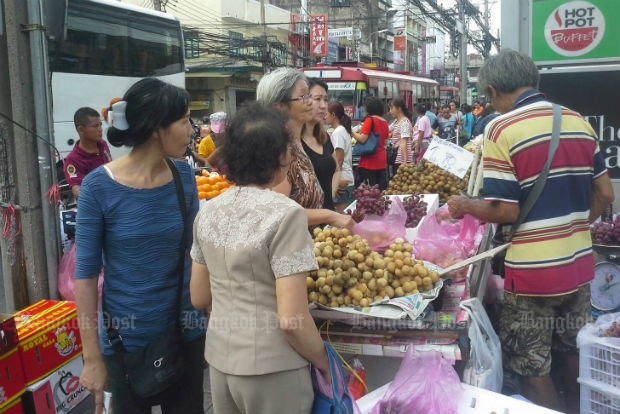
Residue has been detected in over half of the fruits and vegetables inspected by a food safety advocacy group in its latest survey, including those packaged in supermarkets and products awarded with the "Q mark" for quality.
The group says it also found traces of prohibited dangerous substances in 16 types of fruits and vegetables, analysed via a multi-residue pesticide screening from Aug 23 to 29.
Of 158 samples, 56% of the produce was found to have unsafe levels of chemicals, said Prokchol Ousap, coordinator of the Thai-Pesticide Alert Network (Thai-Pan).
Contaminated goods were found in popular wholesale markets in Pathum Thani, Nakhon Pathom and Ratchaburi and in supermarkets, according to the network.
Ms Prokchol said 70.2% of the produce from supermarkets was contaminated.
Chinese kale topped the contaminated veggies with 10 out of 11 samples containing residues. Red chillies (9 of 12) came second, followed by cowpeas and basil (8 of 12), morning glory (7 of 12), small eggplant (6 of 11), cucumber (5 of 11), tomato (3 of 11), cabbage (2 of 11) and Chinese cabbage (2 of 12), according to test results.
In terms of fruit, Sai Namphueng oranges were the most worrisome as traces of chemicals were found in all eight samples. They were followed by dragon fruit (7 of 8), guava (6 of 7), papaya (3 of 6), watermelon (3 of 7) and cantaloupe (1 of 7).
Q mark goods showed a higher prevalence of contamination, 61.5%, than they did during the group's March survey, 57%. The March results led to tension between Thai-Pan and agricultural officials.
The group also said small amounts of residue were found in 2 of 10 samples marked as "organic" by the National Bureau of Agricultural Commodity and Food Standards.
Officials should reform the bureau's certification process and "immediately stop its effort to push ahead with organic farm standards" until problems are solved, said Kingkorn Narintarakul Na Ayudhya, of Food4change.
